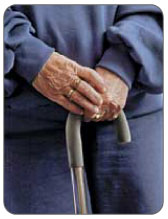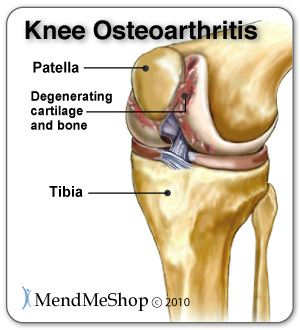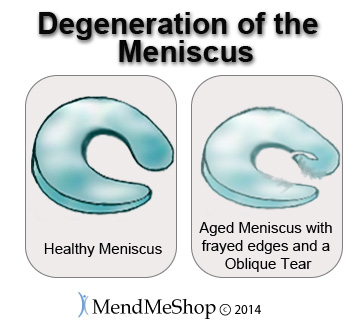The most common symptom of a torn meniscus is pain, although knee pain can be caused by a number of different injuries or conditions. All symptoms of a meniscus tear can be aggravated by walking with a bent knee or pointing your foot. Symptoms also depend on the size and location of the tear. The most common symptoms include:

If you experience a meniscus tear, pain can either be gradual or immediate depending on how severe the damage is and/or how quickly it happened. Often you will feel pain and tenderness in your joint, especially when you touch your knee with slight pressure. If you have a tear, you will usually feel a sharp pain along the joint line in the area of your tear (usually the inside or outer part of the knee). Pain in the middle of your knee often indicates a medial meniscus tear. In some cases you may even experience pain throughout your entire knee joint.
If your meniscus tear is severe enough you might feel a 'giving-way' sensation (instability) in your knee. This feeling may be combined with locking, catching or clicking in your knee. There is usually pain with weight bearing activity such as climbing stairs and twisting movements of the knee when kneeling or squatting.
If you're suffering from a chronic meniscus injury, you might start limping due to severe pain or you'll find that it might be hard for you to stand for long periods of time. A chronic injury could also result in a 'buckling' of your knee when weight is placed on it and loss of range of motion.
If you're suffering from a lateral meniscus tear, meniscal cysts are more likely to develop in the knee. This cyst is a collection of fluid that causes more swelling and inflammation in your knee. A meniscal cyst will decrease your range of movement and make it difficult for you to stretch out your knee. You may also feel some tightness because of swelling and tenderness around your knee.
If your lateral meniscus injury remains untreated you'll continue to experience some inflammation. The lateral meniscus becomes less 'mobile' during flexing, extension and rotation movements of the knee. This immobility of your knee also increases the likelihood of you suffering from a 2nd meniscus injury such as a bucket-handle tear (longitudinal) or transverse tearing.
Pain will become worse when you try to bend, straighten or twist your knee, during or after exercise (especially activities involving deep knee bends) and sometimes even just by putting weight on your knee. Your doctor may recommend that you use a crutch or cane to minimize the load placed on your torn meniscus to alleviate pain and further damage while you are trying to heal.

You may find that your range of motion is limited and that you are not able to bend or straighten your knee all the way. You may also experience a buckling or weakness in your knee that happens when a torn meniscus fragment slips out of being lodged between your bones. A reflex relaxation of the thigh muscles creates weakness in your knee joint resulting in poor stability.

Degeneration is a very significant cause of lateral meniscus tears; over time, the edges of the meniscus become frayed, jagged, and thin. Any repetitive or frequent movement can place stress on the lateral meniscus over the years when evenually, all of a sudden, a meniscus tear happens. The knee joint itself suffers degenerative changes such as arthritis, osteoarthritis and/or cartilage thinning on the ends of the bones and this gradual wear and tear comes from overuse, repetitive knee movements, twisting or prolonged weight bearing activities. Degenerative changes to the knee happen slowly, so you may eventually suffer a torn lateral meniscus from a simple daily activity - the "hair that broke the camels back" if you will. Be aware that this injury can happen to anyone and is not just isolated to athletes.
Once injured, the meniscus is more susceptible to slowly wearing away with regular knee movements. When this happens more friction occurs against the articular cartilage and this cartilage wears away from the surface of the femur and tibia. With less protective covering, the joint begins to deteriorate. If your knee tissue begins to degenerate you have an increased risk of developing osteoarthritis (degenerative arthritis) over time.

You will experience swelling either immediately if your blood vessels are disrupted because of a traumatic event, or within 12 hours after the tear occurs. Swelling over time or recurring is a result of synovial fluid filling the joint cavity, as your body tries to protect itself (this is often called "water on the knee").
These symptoms can range from being annoying to downright painful and can last a few seconds or be persistent for a few weeks. Joint locking occurs when the fragment of torn meniscus does not work its way out of being lodged between your femur and tibia resulting in an inability to straighten or bend your knee. This can be painful and may cause weakness in the knee or in some instances a 'giving way' or snaps, clicks, catches and/or jerks in the knee. You may have to manually move or manipulate your knee to get relief.
There tend to be 4 stages of symptoms dependent on the type of meniscus injury you experience.
If you have a minor tear you will often experience pain and slight swelling within the first 12 hours of noticing the discomfort. These symptoms often go away within a 2 - 3 week period.
If you have a moderate tear you will often have pain near the location of your meniscus tear, especially when twisting or squatting. Swelling will generally increase over 2 - 3 days, as will your stiffness, which will result in a limited range of motion when bending your knee. Symptoms will eventually go away but will tend to recur with minor twisting or overuse.
If you have a severe tear, pieces of torn meniscus can move into your joint space and lead to a locked knee that is very swollen, stiff and painful. These symptoms come on quite quickly. Bruising and swelling with severe pain within minutes of an injury, generally indicate a tear of your ligament as well as your meniscus.
If you suffer from a degenerative tear, it may not have resulted from one specific incident, but rather wear and tear over the years. You also may not recall when or how your symptoms started, however it is often from a squatted position. Pain and minimal swelling are often the only signs you will experience, which last indefinitely. You may also have some knee grinding or catching, depending on the extent of the degeneration.
Although your symptoms may disappear on their own, they often carry-on or return without proper treatment. If a meniscus tear goes untreated, the situation can lead to a complete tear and long-term damage.

Click HERE to Go To Our Online Store We take all major credit cards and Paypal.
If you have questions, call our office at 1-866-237-9608 (toll free continental US).
We are currently offering FREE SHIPPING and a 60 day trial period on all our Wraps.
Product specialists are available 9:00 am to 5:00 pm Eastern Standard Time Monday to Friday.
If any question or concern arises, call us or simply send us an email at any time (we check our emails constantly all throughout the day and night.. even on holidays!). We will respond as soon as possible.
I want to learn more about Post-Surgery Recovery
I want to learn all about Types, Patterns, Shapes & Severity of Meniscus Tears
I want to learn more about TShellz Wrap® Circulatory Boost
I want to learn more about Ice & Heat: Which Is Better For Treatment?
I want to learn more about Meniscus Treatments
I want to learn more about different types of Meniscus Surgery
During your recovery, you will probably have to modify and/or eliminate any activities that cause pain or discomfort at the location of your soft tissue injury until the pain and inflammation settle. The more diligent you are with your treatment and rehabilitation, the faster you will see successful results!
Please be aware that this information is neither intended nor implied to be a substitute for professional medical advice. CALL YOUR HEALTHCARE PROVIDER IMMEDIATELY IF YOU THINK YOU MAY HAVE A MEDICAL EMERGENCY. Always seek the advice of your physician or other qualified health provider before using any of our outstanding products to make sure they are right for you and your condition or if you have any questions regarding a medical condition. Always see your doctor for a proper diagnosis as there are often many injuries and conditions (some very serious) that could be the cause of your pain.
© 2025 In.Genu Design Group, Inc. Contact Us